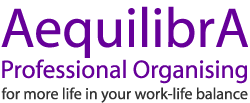Permanent Action Files
Permanent Action files are used to store the paperwork for actions you do frequently, e.g. 'call', 'read', 'pay'. You can think of them as a way of categorising your To Do's.
They are particularly useful for paperwork that doesn't have, or doesn't warrant, it's own file, e.g. a letter you need to respond to but that you don't need to keep for future reference.
Do You Need Permanent Action Files?
If most of your paperwork relates to current projects (Temporary Action files), then you may only have a small quantity of papers that fall into the category of Permanent Action files. If this is the case, then setting up separate Permanent Action files may be complicating your system unnecessarily.
For small quantities you may only need to place these papers into a separate tray or a single hanging file in your desk pedestal, for example, and label it 'Action' so that you know where these papers are when you need them.
If you worry that you might forget to follow up on action items in time, you may find that a Tickler file system is more suitable for you.
When Permanent Action Files Are Useful
If you have a large quantity of paperwork of this type, you may find it easier to store them in separate Permanent Action files.
For each piece of paper you need to act on, decide what action you need to take, e.g. you might need to read it, reply to it, make a telephone call, discuss it with a colleague, pay it, photocopy it, and so on.
Create permanent action files labelled with the actions you frequently carry out, e.g. 'call', 'pay', 'read', 'discuss', 'reply', etc so that you can put the papers straight into the appropriate file as you go through your In-tray. Make sure they're within reach of where you sit, e.g. in hanging files in a desk filing drawer or in a desktop caddy.
Some items may prompt several actions; decide what the next action required is and file according to that. When you've carried out the action you can move the paper to the next appropriate file.
Improved Time Management
Sorting paperwork into the type of action they require can improve your time management and result in less errors being made:-
- instead of switching between different activites, you can save time by doing all of the same type of activity together
- doing the same type of activity in a 'batch' (single-tasking) helps you to focus; multi-tasking can lead people to make mistakes.
- if you need to leave your office to carry out a task it's quicker to make one trip, e.g. discussing items with a colleague, going to the photocopier.
- you can take the items in your 'Read' file with you so that you can still be productive when you're waiting for something or someone, or in case you get delayed while travelling.
Always on the Phone?
A 'Calls' file and 'Calls Expected' file can be particularly useful for anyone that needs to make frequent use of the telephone. It can be very frustrating when you have left a message for someone to call you back but when they do you can't find the paperwork you wanted to discuss with them.
If you place the paperwork in your 'Call' file it will be easy to find when you think it may be a convenient time to try and reach the person. However, if the person you need to speak to isn't available and you leave a message asking them to call you back, you simply move the paperwork into your 'Calls Expected' file.
When they return your call you'll be able to place your hands on the paperwork in seconds. If they don't return your call within a certain amount of time, the paperwork will still be in your 'Calls Expected' file to remind you that the call is still outstanding. If you decide that you want to try to call them again, you can move the paperwork back into your 'Call' file.
Example Permanent Action Files
Which permanent action files you set up will depend on the type of work that you do but the following examples will give you an idea:-
Reply: Papers requiring a response, e.g. forms to complete, letters to write, invitations to reply to.
Call: Papers requiring you to make a phone call.
Calls Expected: Papers awaiting a phone call. When the call arrives these papers are easy to find and within reach of the phone.
Data Entry: Information to be entered into a computer program, e.g. contact manager, CRM system, database, spreadsheet, accounts, payroll, etc.
Calendar Entry: Dates you need to enter into an electronic calendar or paper diary.
Discuss: Paperwork you need to discuss with another person, e.g. your boss, a colleague. Have separate files for each person that you communicate with regularly.
Errands: Papers for things you need to do away from the office, e.g. artwork to take to the printers.
Read: Anything you need or want to read. You could have different 'Read' files, e.g. 'must read' and 'want to read' to separate items requiring a follow-up action from items that you can read at your leisure.
Pay: Bills or invoices awaiting payment.
Reconcile: Papers that need to be reconciled, e.g. bank statements to reconcile in your accounts program, supplier statements to reconcile against invoices, etc.
Expense Reimbursement: For expense receipts to be reimbursed.
Pending: For items you can't act on yet because you're waiting on someone else, e.g. orders. Don't be tempted to use this for papers you don't know what to do with yet because you haven't decided ; it's for papers that you can't act on yet.
Photocopy: Papers that need to be photocopied.
Signature: Papers that need to be signed.

